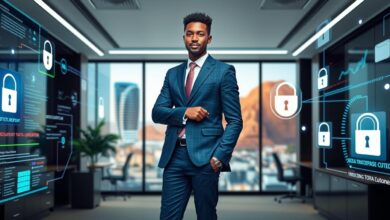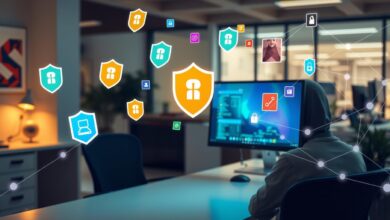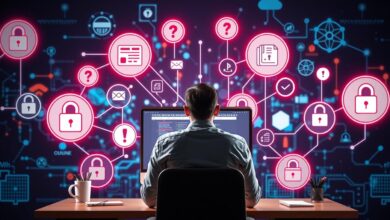How to Protect Your Personal Data on Social Media
More than 56% of the world uses social media, making it crucial to protect personal data. People spend about 147 minutes daily online, increasing privacy risks. This guide offers key tips to keep your info safe online.
With employers checking social media, it’s important to know how to protect your privacy. We’ll show you how to use privacy settings and stay safe online.
Understanding the Risks of Social Media Sharing
In today’s digital world, sharing on social media comes with big risks. People often don’t realize how their online actions can put them in danger. This includes threats like identity theft and financial fraud.
Even though sites like Facebook are very popular, 81% of Americans worry about their privacy. This shows how serious the issue is.
Sharing too much can lead to big problems. Many fraud cases start on social media. Last year, fraud victims lost around $770 million because of these platforms.
Scammers use personal info, location, and updates for bad purposes. This makes it important to be careful about what we share.
Companies use our data for ads, raising big questions. In 2021, over 90,000 people fell victim to social media scams. This shows we need better security fast.
Scams like the “pig butchering scam” have caused over $10 billion in losses. Social media attacks often start with info found online. So, it’s key to watch what we post.
Knowing the risks of social media is the first step to protecting ourselves. Being aware helps keep our online lives safe and secure.
Privacy Settings for Social Media Accounts
It’s key to manage privacy settings on social media to keep your online presence safe. Each platform has its own privacy options. These let users decide who can see their posts.
For example, about 30% of users have their profiles open to everyone. This makes them more likely to fall victim to scams and data breaches.
Users should check and change their privacy settings often. This helps keep personal info safe, letting only trusted friends see your posts. Sadly, only 15% of users do this regularly, leaving many at risk.
Choosing privacy-focused settings can greatly lower risks. Facebook and Instagram, for instance, let you make your account private. It’s crucial not to overlook these settings, as breaches can happen in 10% of accounts.
By regularly updating your privacy settings, you can stay ahead of changes in social media. This keeps your online space safer and more secure.
Protective Measures for Your Online Presence
To keep your data safe on social platforms, it’s key to use strong passwords. Most data breaches happen because of weak passwords. Make sure your passwords are at least 12 characters long, with a mix of letters, numbers, and symbols.
Two-factor authentication adds an extra layer of security to your accounts. This makes it harder for hackers to get in.
Sharing too much personal info on social media can lead to security issues. Over 70% of internet users have faced problems because of this. It’s important to check your privacy settings on sites like Facebook, Twitter, and Instagram to keep your info safe.
Public Wi-Fi networks can be risky. More than 60% of people use them without thinking about the dangers. Try to avoid doing sensitive stuff on public Wi-Fi. Also, closing old accounts can help keep your info safe from hackers.
Keeping your software up to date is crucial. It helps protect against malware and cyber threats. Look for websites with “HTTPS” in the URL and a padlock symbol to ensure they’re secure.
Being careful with emails and links is also important. About 90% of data breaches come from phishing scams. Using antivirus and anti-spyware tools can also help keep you safe online.
Backing up your data regularly is a good idea. Use an external hard drive to protect against ransomware or other data loss. By following these tips, you can keep your online presence safe and private.
How to Protect Your Personal Data on Social Media
Social media is convenient but also risks your personal info. It’s key to know what’s at risk and how to share less online.
Identifying Personal Information at Risk
Knowing what personal info to keep private is vital. Important data to keep hidden includes:
- Identification numbers
- Live location data
- Personal contact information
- Financial details
Sharing these online can lead to identity theft and fraud. So, it’s wise to be careful with what you share.
Avoiding Over-sharing on Social Networks
Sharing too much can be risky. Talking about your daily life or where you are can tell thieves where to find you. Here’s how to share less:
- Don’t post about when and where you’ll be.
- Never share ID numbers or financial info.
- Keep personal thoughts and stories to yourself.
- Check your privacy settings often to control who sees your posts.
Creating Strong, Unique Passwords
In today’s digital world, making strong, unique passwords is key to keeping your info safe. Especially on social media, where data breaches can happen. Knowing how to create good passwords is the first step in protecting your data.
Guidelines for Secure Password Creation
A strong password should have at least 12 characters. It should mix uppercase and lowercase letters, numbers, and symbols. Don’t use personal info, as it makes you an easy target for hackers. Here are some tips for making strong passwords:
- Choose passwords longer than 10 characters.
- Don’t use the same password for all accounts.
- Use a mix of letters, numbers, and symbols.
- Avoid dictionary words and personal info.
- Change your password if you think it’s been hacked.
Using a password manager like LastPass or Google Chrome’s can help. These tools keep your passwords safe and make it easier to use multi-factor authentication. A good trick is to use a memorable phrase as your password or create a clever hint.
Utilizing Two-Factor Authentication
Two-factor authentication (2FA) boosts online security a lot. It makes it hard for hackers to get into your accounts. You need a password and a code sent to your phone to log in.
This combo keeps your account safe even if someone guesses your password. It’s a strong way to protect your online stuff.
2FA is a key part of keeping accounts safe. It uses different ways to verify who you are. This can be something you know, something you have, or something you are.
But, just using passwords isn’t enough. They can be hacked through phishing or guessing. That’s why 2FA is becoming more popular.
There are many ways to use 2FA. You can get a special token, a smart card, or a mobile app. These tools send you a code to enter.
Experts say everyone should use 2FA for important accounts. It might take a bit longer to log in. But, it’s worth it for the extra security.
Using 2FA helps keep your personal info safe. It’s a big step in protecting yourself online.
Managing Connection Requests and Friendships
In today’s digital world, handling connection requests is key. Social media can be overwhelming with its vast networks and many requests. A shocking fact is that 67% of users have accepted friend requests from strangers. This can lead to risks like fake profiles and scams.
It’s important to be careful when accepting friend requests. Only accept from people you know well. This helps keep you safe from online dangers. Even friends can accidentally share private info, which is a big risk.
Think about how you handle online interactions. Check your friend list often and remove unknown contacts. Using privacy settings on social media can also help keep your info safe.
Being smart about managing connections is crucial. Stay alert for scams and phishing online. By being cautious, you can enjoy social media safely and protect your personal info.
Safeguarding Personal Information Online
Online interactions can lead to risks. It’s key to know what personal info to keep private. By following smart sharing rules, you can stay safe on social media and protect your personal info online.
What to Avoid Sharing Publicly
Being careful about what you share online is crucial. Here are some tips:
- Avoid posting full names and personal identification details that could easily be exploited.
- Do not share sensitive locations like home addresses or places visited frequently.
- Refrain from posting images showcasing personal assets or identifiable landmarks.
- Be skeptical of friend requests, especially from unknown individuals, as they may have ill intentions.
- Consider the privacy settings of each app and select the minimum data sharing options possible.
Every click or share can be risky, especially on public Wi-Fi. Data breaches have hit millions, showing the need for caution online. Using apps like IronVest, with its bank-grade security, can help protect you. IronVest uses advanced tech, like cross-device face biometrics, for fraud protection.
Knowing these risks and following safety tips can make your online experience safer. By regularly checking app permissions and encrypting data, you can better protect yourself. Remember, keeping your personal info safe online is a must for everyone in the digital world.
Recognizing Phishing Scams on Social Media
Phishing scams on social media are getting smarter, posing a big threat to users. Scammers send out thousands of these attacks every day. They use tricks to get people to share personal info, like bank details and social security numbers.
Spotting scams early can help prevent online fraud. Look out for suspicious messages or links, especially those that try to rush you. If you get a message from a company you don’t know, it’s probably a scam. Scammers often pretend to be friendly, so always check who they are first.
Knowing how scammers work on social media is key to staying safe online. They use a few main tricks:
- Domain spoofing: They fake email addresses to trick people.
- Clone phishing: They copy real messages but add bad links or files.
- Voice phishing (vishing) and SMS phishing (smishing): They use these to get sensitive info.
To avoid online fraud, stay alert and use good security. Using multi-factor authentication helps block phishing attacks. Also, backing up your data on external hard drives or in the cloud keeps it safe. Reporting scams to groups like the Anti-Phishing Working Group and the FTC helps fight this problem.
Knowing the signs and how phishing scams work can help you stay safe. Keeping up with scam education is important for a safer online world.
Monitoring Your Account Activity
It’s important to keep an eye on your social media accounts. Regular checks help spot any unauthorized access. Recently, social media account takeovers have skyrocketed, making it crucial to stay alert.
Always review your login history for odd activity. Tracking device sign-ins can show suspicious access. If you see login attempts from places you don’t know, act fast.
Logging out of unknown devices is key to protecting your info. This step is vital to keep your personal details safe.
Using social media security features can help a lot. Turning on notifications for account changes can warn you of unauthorized edits. With over 162,000 Americans hit by social media scams last year, staying informed is essential.
Also, social media platforms like Facebook work hard to block billions of fake accounts each year. Scams are getting smarter, making it important for users to watch their accounts closely. By being vigilant, we can protect our online presence from threats.
Conclusion
Keeping personal data safe on social media is key. Events like the Cambridge Analytica scandal in 2018 show why we must be careful. By changing privacy settings and using strong passwords, we can lower our risk.
Digital hygiene is very important. Scandals like Instagram’s password issue and the 2020 Twitter hack remind us to stay alert. Laws like GDPR help protect our data, making social media safer.
Being careful online is not just about safety. It also makes our online time better. With new tech and clearer rules from social media sites, we can handle digital privacy better. By focusing on safety, we can enjoy social media more while keeping our data secure.
FAQ
How can I protect my personal data on social media?
What are some privacy settings I should modify on my social media accounts?
What steps can I take to recognize phishing scams on social media?
Why is it essential to have unique passwords for each of my social media accounts?
How can two-factor authentication improve my account security?
What types of information should I avoid sharing on social media?
How can I monitor my account activity for security?
What are the risks associated with over-sharing on social media?
How can I manage connection requests on social media safely?
What is digital hygiene, and how does it contribute to my online safety?
Published on: 19 de September de 2024

Bakari Romano
Bakari Romano is a finance and investment expert with a strong background in administration. As a dedicated professional, Bakari is passionate about sharing his knowledge to empower individuals in managing their finances effectively. Driven by this mission, he founded FinancasPro.com, where he provides insightful and practical advice to help people make informed financial decisions. Through his work on the site, Bakari continues to make finance accessible and understandable, bridging the gap between expert knowledge and everyday financial needs.






